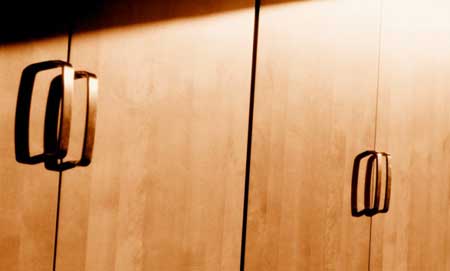
|
NBA center Jason Collins recently announced he was gay in a cover story for Sports Illustrated . In other words, he "came out of the closet." This expression for revealing one's homosexuality may seem natural. Being in the closet implies hiding from the outside world, and the act of coming out of it implies the will to stop hiding. But though the closet has long been a metaphor for privacy or secrecy, its use with reference to homosexuality is relatively recent. According to George Chauncey's comprehensive history of modern gay culture, Gay New York , the closet metaphor was not used by gay people until the 1960s. Before then, it doesn't appear anywhere "in the records of the gay movement or in the novels, diaries, or letters of gay men and lesbians." "Coming out," however, has long been used in the gay community, but it first meant something different than it does now. "A gay man's coming out originally referred to his being formally presented to the largest collective manifestation of prewar gay society, the enormous drag balls that were patterned on the debutante and masquerade balls of the dominant culture and were regularly held in New York, Chicago, New Orleans, Baltimore, and other cities." The phrase "coming out" did not refer to coming out of hiding, but to joining into a society of peers. The phrase was borrowed from the world of debutante balls, where young women "came out" in being officially introduced to society. The gay debutante balls were a matter of public record and often covered in the newspaper, so "coming out" within gay society often meant revealing your sexual orientation in the wider society as well, but the phrase didn't necessarily carry the implication that if you hadn't yet come out, you were keeping it a secret. There were other metaphors for the act of hiding or revealing homosexuality. Gay people could "wear a mask" or "take off the mask." A man could "wear his hair up" or "let his hair down," or "drop hairpins" that would only be recognized by other gay men. It is unclear exactly when gay people started using the closet metaphor, but "it may have been used initially because many men who remained 'covert' thought of their homosexuality as a sort of 'skeleton in the closet.'" It may also have come from outsiders who viewed it that way. It seems that "coming out of the closet" was born as a mixture of two metaphors: a debutante proudly stepping into the arms of a community and a shocking secret being kept in hiding. Now the community is the wider community, and the secret is no longer shocking."Coming out" is a useful phrase, but it need not imply a closet. |
NBA中鋒杰森·柯林斯最近在《體育畫報》的封面故事中宣布他是同性戀。換言之,他“出柜”了。這樣揭示一個人是同性戀的表述看起來很自然。在衣柜里則意味著逃避外界,而出來這個動作意味著將會不再躲藏。盡管衣柜一直是隱私和秘密的隱喻,有關同性戀的用法也是最近的事。 據喬治·昌西對整個當代同性戀文化歷史一書《紐約同性戀》的記錄,“衣柜”一詞直到上世紀60年代才被同性戀者用作隱喻詞。在這之前,這并沒有“在同性戀運動記錄,或者是同性戀小說、日記、信件中出現。” “出柜”一詞盡管一直由男同群體使用,但這個詞的最初的意思是“某些與現在不同的”。“一個男同出柜最一開始指的是正式地在戰前男同社會舉辦的最大的集會中出現。這些集會規模龐大,與主流社會舉辦的年輕上流女子聚會和化妝舞會相媲美,通常在紐約、芝加哥、新奧爾良、巴爾的摩以及其他城市舉行。” “出柜”一詞并不是指從躲藏的地方出來,而是加入到同伴之中。這個詞從上流女子舞會里借用過來的,因為在這種場合中,年輕女子正式介紹到社交圈會時,都稱作“出柜”。 男同的初次社交舞會一般都有公開記錄,也經常出現在報紙里面,所以“出柜”一詞在同性戀圈里通常表示在范圍更廣的社交圈中表明你的性取向。但是這個詞并不是表示,你還沒有“出柜”的情況下,你仍然將此當作秘密。另外還有一些其他表示隱藏或公開同性取向的隱喻詞。同性戀者可以“帶上面具”或者“脫下面具”。一個人可以“挽起你的頭發”或者“放下你的頭發”,又或者“脫下發夾”,這些動作只能由其他男同看得出。 男同使用“出柜”一詞作隱喻的確切時間并清楚,不過“它最初開始使用時,是因為很多男士對他們的同性戀身份仍然保持著‘隱密'思想,認為他們這像是’見不得光的秘密'。”它也可能是外面的人這樣想像的。看起來“出柜”的出現是兩個隱喻詞的匯合:公開參加同一群體的社交活動,以及一個隱藏著的驚人秘密。現在的社交群體更加寬泛,秘密已不再讓人驚奇了。“出柜”是一個有用的說法,不過并不暗指隱秘。 相關閱讀 (翻譯:tamalu? 編輯:Julie) |
|
|